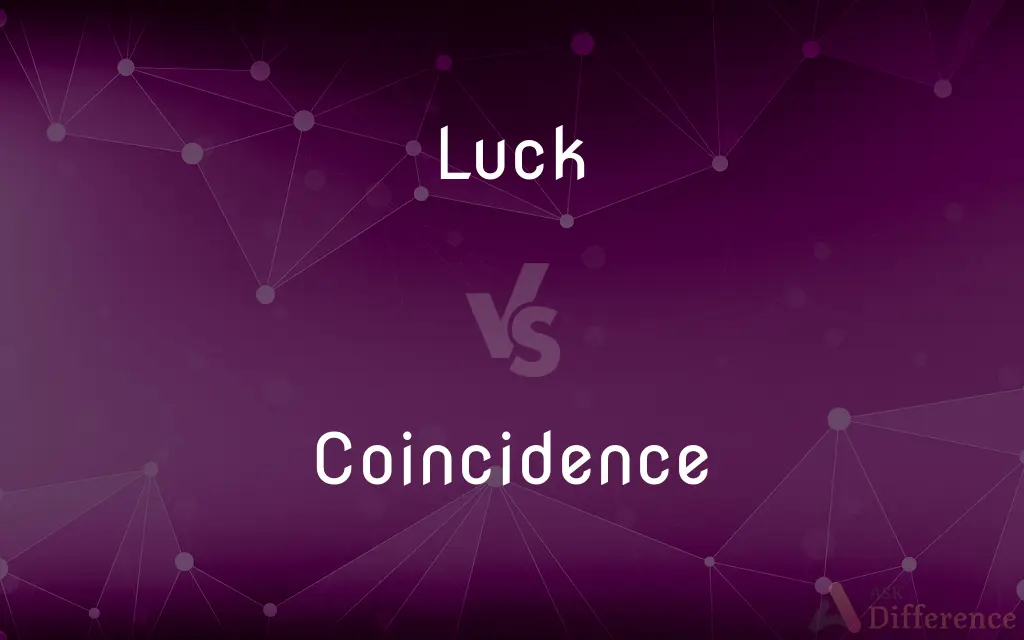Luck vs. Coincidence — What's the Difference?
Edited by Tayyaba Rehman — By Urooj Arif — Updated on May 21, 2024
Luck involves the influence of chance on favorable or unfavorable outcomes, while coincidence refers to events occurring at the same time by chance without causal connection.

Difference Between Luck and Coincidence
Table of Contents
ADVERTISEMENT
Key Differences
Luck is often perceived as a force that brings good or bad fortune, influencing events in a person's life. It is subjective and can be seen as a supernatural or random factor affecting outcomes. For instance, finding money on the street might be considered a stroke of good luck. Coincidence, on the other hand, refers to the occurrence of two or more events at the same time by chance, without any intentional connection. It is neutral and does not imply any influence of fortune or supernatural forces. For example, running into an old friend in a different city by chance is a coincidence.
While luck is seen as an ongoing force that can be good or bad, coincidences are isolated instances without ongoing implications. Luck can affect a series of events and is often used to explain repeated patterns or outcomes. Coincidence explains unexpected, random occurrences without suggesting any pattern or ongoing influence.
People sometimes confuse luck with coincidence because both involve elements of chance. However, luck implies a broader, more pervasive influence, whereas coincidence is specific and isolated. The belief in luck can affect people's attitudes and behaviors, making them more superstitious or cautious. Coincidence, in contrast, often leads to curiosity or surprise without significantly altering behavior.
Comparison Chart
Definition
Influence of chance on favorable/unfavorable outcomes
Simultaneous occurrence of unrelated events
Nature
Subjective, can be good or bad
Neutral, neither good nor bad
ADVERTISEMENT
Implication
Suggests ongoing influence
Isolated instance without ongoing effect
Perception
Often seen as supernatural or random force
Viewed as random and surprising
Impact on Behavior
Can lead to superstition or cautious behavior
Leads to curiosity or surprise
Compare with Definitions
Luck
Success or failure brought by chance rather than effort.
Winning the lottery is often attributed to luck.
Coincidence
Accidental concurrence.
The coincidence of our travel plans was unexpected.
Luck
A force believed to bring good or bad fortune.
He always carries a rabbit's foot for luck.
Coincidence
Events happening together without a causal link.
The coincidence of their birthdays surprised everyone.
Luck
An outcome that seems favorable or unfavorable.
It was bad luck that it rained on their wedding day.
Coincidence
Unexpected simultaneous events.
It was just a coincidence that we both arrived early.
Luck
Luck is the phenomenon and belief that defines the experience of notably positive, negative, or improbable events. The naturalistic interpretation is that positive and negative events may happen all the time, both due to random and non-random natural and artificial processes, and that even improbable events can happen by random chance.
Coincidence
The occurrence of events at the same time by chance.
It was a coincidence that they both wore red shirts.
Luck
Success or failure apparently brought by chance rather than through one's own actions
They're supposed to bring good luck
It was just luck that the first kick went in
Coincidence
A surprising alignment of events.
Meeting her in the same café was a strange coincidence.
Luck
Chance to find or acquire
He lucked into a disc-jockey job
Coincidence
A coincidence is a remarkable concurrence of events or circumstances that have no apparent causal connection with one another. The perception of remarkable coincidences may lead to supernatural, occult, or paranormal claims.
Luck
The chance happening of fortunate or adverse events; fortune
They met one day out of pure luck.
Coincidence
A remarkable concurrence of events or circumstances without apparent causal connection
They met by coincidence
It was a coincidence that she was wearing a jersey like Laura's
Luck
Good fortune or prosperity; success
We wish you luck.
Coincidence
The fact of corresponding in nature or in time of occurrence
The coincidence of interest between the mining companies and certain politicians
Luck
One's personal fate or lot
It was just my luck to win a trip I couldn't take.
Coincidence
The presence of ionizing particles or other objects in two or more detectors simultaneously, or of two or more signals simultaneously in a circuit.
Luck
To gain success or something desirable by chance
Lucked into a good apartment.
Lucked out in finding that rare book.
Coincidence
The state or fact of occupying the same relative position or area in space.
Luck
Something that happens to someone by chance, a chance occurrence, especially a favourable one.
The raffle is just a matter of luck.
Sometimes it takes a bit of luck to get success.
I couldn't believe my luck when I found a fifty dollar bill on the street.
Gilbert had some bad luck yesterday — he got pick-pocketed and lost fifty dollars.
Coincidence
A sequence of events that although accidental seems to have been planned or arranged.
Luck
A superstitious feeling that brings fortune or success.
He blew on the dice for luck.
I wish you lots of luck for the exam tomorrow.
Coincidence
Of objects, the property of being coincident; occurring at the same time or place.
Luck
Success.
I tried for ages to find a pair of blue suede shoes, but didn't have any luck.
He has a lot of luck with the ladies, perhaps it is because of his new motorbike.
Coincidence
Of events, the appearance of a meaningful connection when there is none.
That the two writers were born and died on the same day is just a coincidence, although there are many conspiracy theories about it.
Luck
The results of a random number generator.
Coincidence
(analysis) A coincidence point.
Luck
To find something through good fortune; used with into, on, onto or upon.
Coincidence
(geometry) A fixed point of a correspondence; a point of a variety corresponding to itself under a correspondence.
Luck
That which happens to a person; an event, good or ill, affecting one's interests or happiness, and which is deemed casual; a course or series of such events regarded as occurring by chance; chance; hap; fate; fortune; often, one's habitual or characteristic fortune; as, good, bad, ill, or hard luck. Luck is often used by itself to mean good luck; as, luck is better than skill; a stroke of luck.
If thou dost play with him at any game,Thou art sure to lose; and of that natural luck,He beats thee 'gainst the odds.
Coincidence
The condition of occupying the same place in space; as, the coincidence of circles, surfaces, etc.
Luck
Your overall circumstances or condition in life (including everything that happens to you);
Whatever my fortune may be
Deserved a better fate
Has a happy lot
The luck of the Irish
A victim of circumstances
Success that was her portion
Coincidence
The condition or fact of happening at the same time; as, the coincidence of the deaths of John Adams and Thomas Jefferson.
Luck
An unknown and unpredictable phenomenon that causes an event to result one way rather than another;
Bad luck caused his downfall
We ran into each other by pure chance
Coincidence
Exact correspondence in nature, character, result, circumstances, etc.; concurrence; agreement.
The very concurrence and coincidence of so many evidences . . . carries a great weight.
Those who discourse . . . of the nature of truth . . . affirm a perfect coincidence between truth and goodness.
Luck
An unknown and unpredictable phenomenon that leads to a favorable outcome;
It was my good luck to be there
They say luck is a lady
It was as if fortune guided his hand
Coincidence
An event that might have been arranged although it was really accidental
Luck
Fortunate circumstances.
She considered it pure luck to find the last ticket.
Coincidence
The quality of occupying the same position or area in space;
He waited for the coincidence of the target and the cross hairs
Luck
Chance occurrences affecting life.
They met by sheer luck at the concert.
Coincidence
The temporal property of two things happening at the same time;
The interval determining the coincidence gate is adjustable
Common Curiosities
Is coincidence always surprising?
Coincidences often surprise people due to their unexpected nature.
How does luck affect behavior?
Belief in luck can lead to superstitious or cautious behavior.
Are coincidences common?
Coincidences can happen frequently, but each instance is typically unexpected.
What is luck?
Luck is the influence of chance on favorable or unfavorable outcomes in life.
What is a coincidence?
Coincidence is the simultaneous occurrence of events by chance without any causal connection.
Does luck imply a supernatural force?
Some people believe luck involves a supernatural or random force influencing events.
Do coincidences have any ongoing effects?
Coincidences are isolated events and do not imply ongoing influence.
How do people view luck and coincidence differently?
Luck is seen as an ongoing influence, while coincidence is viewed as a specific, random event.
Can luck be both good and bad?
Yes, luck can be perceived as either good or bad depending on the outcome.
Can luck explain repeated patterns?
Yes, people often attribute repeated patterns of outcomes to luck.
Can both luck and coincidence be positive or negative?
Luck can be positive or negative, whereas coincidence is neutral but can involve positive or negative events.
Why do people confuse luck with coincidence?
Both involve elements of chance, but luck implies broader influence while coincidence refers to isolated events.
Do coincidences lead to changes in behavior?
Coincidences typically lead to surprise or curiosity but do not usually alter behavior significantly.
Are superstitions related to luck or coincidence?
Superstitions are more closely related to luck, as they involve beliefs about influencing outcomes.
Is coincidence related to patterns?
No, coincidence refers to single, random events without suggesting any pattern.
Share Your Discovery

Previous Comparison
Pollen vs. Spore
Next Comparison
Pool vs. LidoAuthor Spotlight
Written by
Urooj ArifUrooj is a skilled content writer at Ask Difference, known for her exceptional ability to simplify complex topics into engaging and informative content. With a passion for research and a flair for clear, concise writing, she consistently delivers articles that resonate with our diverse audience.
Edited by
Tayyaba RehmanTayyaba Rehman is a distinguished writer, currently serving as a primary contributor to askdifference.com. As a researcher in semantics and etymology, Tayyaba's passion for the complexity of languages and their distinctions has found a perfect home on the platform. Tayyaba delves into the intricacies of language, distinguishing between commonly confused words and phrases, thereby providing clarity for readers worldwide.
















































